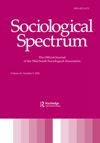Linking individual and collective social capital: operationalization, association, and sociodemographic heterogeneity
IF 1.1
3区 社会学
Q2 SOCIOLOGY
引用次数: 0
Abstract
Abstract Despite the ubiquity of “social capital” in sociological research, this measure has broadly been conceptualized as both an individual and collective level measure. We explore the link between these two levels within the United States using recently constructed scales of state- and county-level social capital linked to the geocoded 2000–2018 General Social Survey. Collective social capital is associated with greater individual-level trust and voting. However, heterogeneity analysis reveals substantial differences by race/ethnicity, education, sex, and marital status. Moreover, there is heterogeneity for individual-level confidence in institutions and social interaction frequency, despite no overall relationship between those outcomes and collective social capital. Only some of our results align with existing dimensions of stratification, showing the importance of being clear about the operationalization and level of social capital being studied and highlighting how the “advantages” of collective social capital may not extend broadly to all the members of the collective.将个人和集体社会资本联系起来:操作性、关联性和社会人口异质性
摘要尽管“社会资本”在社会学研究中无处不在,但这一衡量标准已被广泛概念化为个人和集体层面的衡量标准。我们使用最近构建的州和县级社会资本量表,与地理编码的2000-2008年综合社会调查相联系,探讨了美国这两个水平之间的联系。集体社会资本与更大的个人层面的信任和投票权有关。然而,异质性分析揭示了种族/民族、教育、性别和婚姻状况的显著差异。此外,尽管这些结果与集体社会资本之间没有总体关系,但个人对制度和社会互动频率的信心存在异质性。只有一些结果与现有的分层维度一致,表明了明确所研究的社会资本的运作和水平的重要性,并强调了集体社会资本的“优势”可能不会广泛延伸到集体的所有成员。
本文章由计算机程序翻译,如有差异,请以英文原文为准。
求助全文
约1分钟内获得全文
求助全文
来源期刊

Sociological Spectrum
SOCIOLOGY-
CiteScore
3.80
自引率
5.60%
发文量
16
期刊介绍:
Sociological Spectrum publishes papers on theoretical, methodological, quantitative and qualitative research, and applied research in areas of sociology, social psychology, anthropology, and political science.
 求助内容:
求助内容: 应助结果提醒方式:
应助结果提醒方式:


